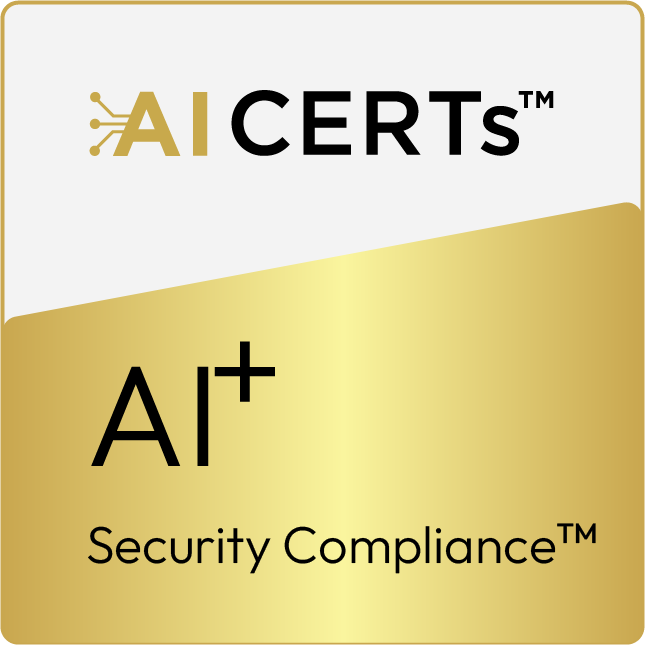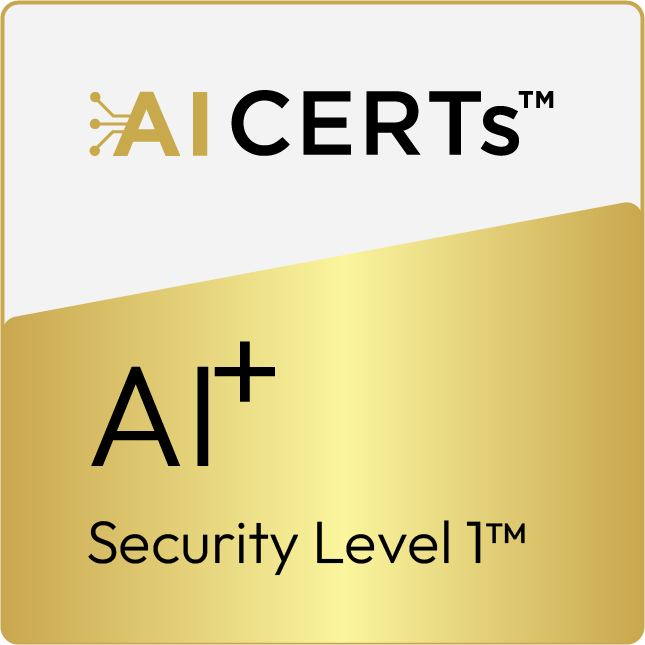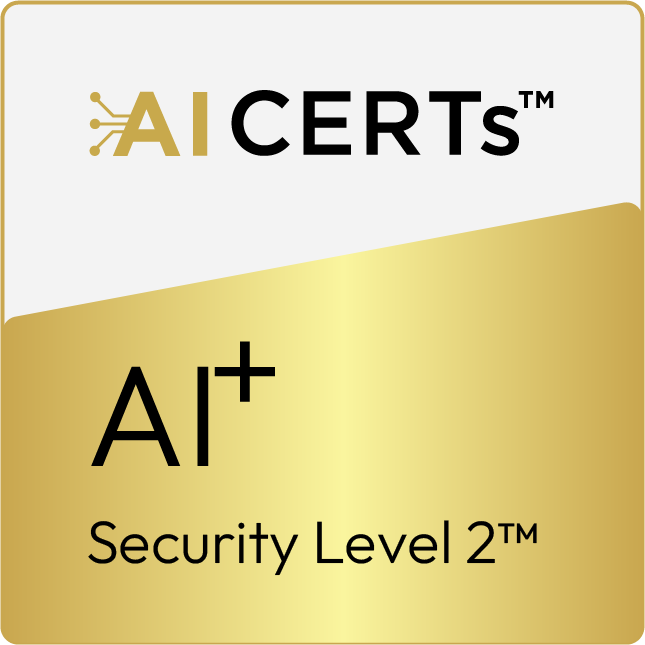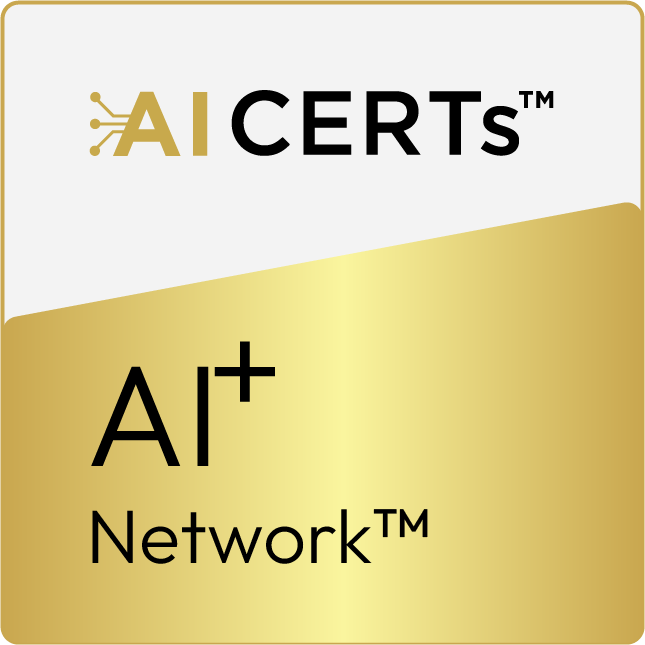"*" indicates required fields
AI+ Security Compliance™
AT-230
Empowering Compliance Through AIThe AI+ Security Compliance is an advanced course that merges the fundamental principles of cybersecurity compliance with the transformative power of artificial intelligence (AI). Building on the CISSP framework, this course focuses on how AI can enhance compliance processes, improve risk management, and ensure robust security measures in alignment with regulatory standards. This course introduces you to the core principles of cyber security compliances, while exploring the potential of AI to enhance your security posture. This course structure integrates comprehensive cybersecurity compliance principles with advanced AI applications, providing learners with the necessary skills to ensure compliance and enhance security through AI technologies.
Enroll Now
Prerequisites
- Basic understanding of cybersecurity principles.
- Knowledge of networking fundamentals.
- Familiarity with programming concepts and languages (Python recommended)
- An introductory course on AI or machine learning is beneficial but not required.
Modules
10
Examination
1
50 MCQs
90 Minutes
Passing Score
70%
Recertification Requirements
AI CERTs requires recertification every year to keep your certification valid. Notifications will be sent three months before the due date, and candidates must follow the steps in the candidate handbook to complete the process.
Need Help? If you have any questions or need assistance with recertification, please reach out to our support team at support@aicerts.ai
Certification Modules
- 1.1 Overview of Cybersecurity Compliance
- 1.2 International Compliance Standards
- 1.3 Developing Compliance Programs
- 1.4 Implementing Compliance Programs
- 1.5 AI in Cybersecurity Compliance
- 1.6 Case Studies and Applications
- 2.1 Risk Management Frameworks
- 2.2 Conducting Risk Assessments
- 2.3 AI in Risk Assessment
- 2.4 Compliance and AI
- 2.5 Incident Response and AI
- 3.1 Data Classification and Protection
- 3.2 AI in Privacy Protection
- 3.3 Asset Management with AI
- 3.4 Case Studies and Best Practices
- 4.1 Secure Design Principles
- 4.2 AI in Cryptography
- 4.3 AI in Vulnerability Assessment
- 4.4 Security Models and AI
- 5.1 Network Security Fundamentals
- 5.2 AI in Network Monitoring
- 5.3 AI-driven Network Defense
- 5.4 Compliance in Network Security
- 6.1 IAM Fundamentals
- 6.2 AI in Identity Verification
- 6.3 Access Control and AI
- 6.4 Threats to IAM and AI Solutions
- 7.1 Security Testing Techniques
- 7.2 AI in Security Testing
- 7.3 Continuous Monitoring and AI
- 7.4 Incident Response Planning
- 7.5 Managing Cybersecurity Incidents
- 7.6 Legal and Regulatory Considerations
- 8.1 Security Operations Center (SOC)
- 8.2 Data Classification and Protection
- 8.3 Privacy Compliance
- 8.4 Disaster Recovery and AI
- 8.5 AI in Security Orchestration
- 9.1 Secure Software Development Life Cycle (SDLC)
- 9.2 AI in Application Security Testing
- 9.3 AI in Secure DevOps
- 9.4 Threat Modeling and AI
- 9.5 Internal and External Audits
- 9.6 Continuous Monitoring
- 10.1 Emerging AI Technologies
- 10.2 AI in Cyber Threat Intelligence
- 10.3 Quantum Computing and AI
- 10.4 Ethical Considerations and AI Governance
- 10.5 Practical Applications
Certification Modules
- 1.1 Overview of Cybersecurity Compliance
- 1.2 International Compliance Standards
- 1.3 Developing Compliance Programs
- 1.4 Implementing Compliance Programs
- 1.5 AI in Cybersecurity Compliance
- 1.6 Case Studies and Applications
- 2.1 Risk Management Frameworks
- 2.2 Conducting Risk Assessments
- 2.3 AI in Risk Assessment
- 2.4 Compliance and AI
- 2.5 Incident Response and AI
- 3.1 Data Classification and Protection
- 3.2 AI in Privacy Protection
- 3.3 Asset Management with AI
- 3.4 Case Studies and Best Practices
- 4.1 Secure Design Principles
- 4.2 AI in Cryptography
- 4.3 AI in Vulnerability Assessment
- 4.4 Security Models and AI
- 5.1 Network Security Fundamentals
- 5.2 AI in Network Monitoring
- 5.3 AI-driven Network Defense
- 5.4 Compliance in Network Security
- 6.1 IAM Fundamentals
- 6.2 AI in Identity Verification
- 6.3 Access Control and AI
- 6.4 Threats to IAM and AI Solutions
- 7.1 Security Testing Techniques
- 7.2 AI in Security Testing
- 7.3 Continuous Monitoring and AI
- 7.4 Incident Response Planning
- 7.5 Managing Cybersecurity Incidents
- 7.6 Legal and Regulatory Considerations
- 8.1 Security Operations Center (SOC)
- 8.2 Data Classification and Protection
- 8.3 Privacy Compliance
- 8.4 Disaster Recovery and AI
- 8.5 AI in Security Orchestration
- 9.1 Secure Software Development Life Cycle (SDLC)
- 9.2 AI in Application Security Testing
- 9.3 AI in Secure DevOps
- 9.4 Threat Modeling and AI
- 9.5 Internal and External Audits
- 9.6 Continuous Monitoring
- 10.1 Emerging AI Technologies
- 10.2 AI in Cyber Threat Intelligence
- 10.3 Quantum Computing and AI
- 10.4 Ethical Considerations and AI Governance
- 10.5 Practical Applications
Exam Objectives
AI-Enhanced Compliance Management
Students will be able to integrate AI tools and techniques to streamline and automate compliance processes, ensuring adherence to international cybersecurity standards and regulations.
Risk Management with AI
Students will develop the ability to use AI for conducting comprehensive risk assessments, identifying potential vulnerabilities, and implementing proactive risk mitigation strategies.
AI-Driven Security Solutions
Students will gain hands-on experience with AI applications in security, learning how to implement AI-powered tools for incident response, threat detection, and asset security.
Understanding of Future AI Trends in Cybersecurity
Students will be equipped with knowledge of emerging AI technologies, such as quantum computing, and their implications for cybersecurity, allowing them to stay ahead of evolving threats and innovations.
Hear it from the Learners

Marc H
Happy to share I've completed the AI+ Executive Certification from AI CERTs! This program has sharpened my skills in strategic AI application + implementation, further equipping me to lead AI-driven organizational transformation.

Georgia L
As VP Operations, my recent completion of the AI+ Executive exam through AI CERTs was a pivotal step in advancing my AI skill set as we embrace an AI-driven future. This certification not only deepened my understanding of AI's broad impact across various divisions but also equipped me with the tools to make informed, strategic decisions.

Antonio C
AI+ Executive™ Instructor Guide Certificate. Today, I am part of the team of #CompuEducación instructors to teach the #AI CERTs AI+Executive certification course . This 8-hour course is a new standard for business leaders who want to start a solid path in the adoption of AI for the transformation of their companies. The technological, business, ethical, legal and strategy foundations are covered. The examples of using “AI” are practical, up-to-date, and touch on the different variants of “AI.”

Doug F
Excited to successfully complete AI Cert's AI+ Marketing certification course! For us marketers, it's imperative to embrace AI and take an active effort in learning how to harness its capabilities to stay relevant and be on the cutting edge of tech.
Discover Your Ideal Role-Based Certifications and Programs!
Not sure which certifications to go for? Take our quick assessment to discover the perfect role-based certifications and programs tailored just for you.
Get CertifiedFrequently Asked Questions
This course focuses on how to ensure that AI systems comply with security standards and regulations across industries.
Ideal for security professionals, compliance officers, and AI developers working on security-critical AI projects.
The course covers compliance frameworks, regulatory requirements for AI systems, and secure AI deployment strategies.
You will learn about GDPR, HIPAA, and NIST compliance for AI systems, among others.
This certification demonstrates that you can ensure AI systems comply with industry and regulatory security standards, enhancing your career in both AI and cybersecurity sectors.







